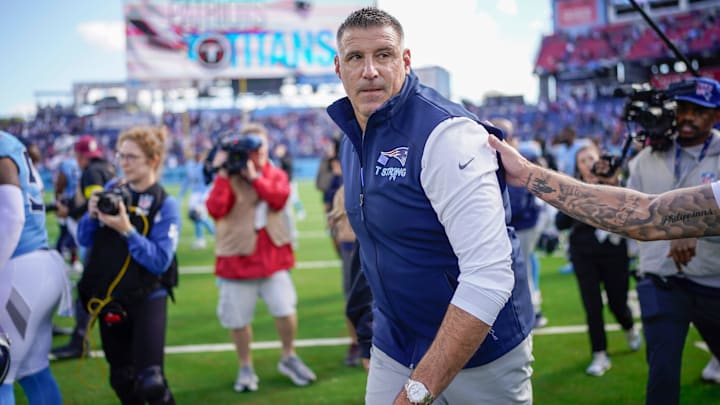The New England Patriots find themselves atop not just the AFC, but the entire NFL with a 7-2 record through nine weeks. Amid the excitement, many fans clamored for the team to make trades to solidify its status as a contender.
While this year’s deadline was one of the busiest of the 21st century, New England stood pat.
Fans can debate whether that was a mistake, but one factor reportedly complicated negotiations: head coach Mike Vrabel’s former team, the Tennessee Titans, took a stance against doing business with the Patriots.
Titans Reportedly Refused to Deal With Patriots
A few hours before the deadline, Boston Sports Journal’s Mike Giardi reported that NFL sources suggested Tennessee’s owner, Amy Adams Strunk, was hesitant to make deals with New England due to how Vrabel’s tenure in Nashville ended.
“There has been some conversations league-wide that Tennessee might be unwilling to make deals with New England because the owner, Amy Adams Strunk, continues to think too much about how things ended with Vrabel and is not inclined to help his new team,” Giardi wrote.
The Titans, who ultimately made only one trade at the deadline, were a prime candidate to make moves given their league-worst 1-8 record. With Tennessee 13th in the NFL in total cap allocations (per Spotrac), it would have made sense to offload some spending.
Two players on Tennessee’s roster—running back Tony Pollard and edge rusher Arden Key—were reportedly of interest to the Patriots. But according to Giardi’s sources, the Titans were unwilling to engage New England in those negotiations.
Inside Vrabel’s Fallout With Titans Ownership
Vrabel’s tenure as Titans head coach included some of the franchise’s most successful seasons in decades. Tennessee went 54-45 under Vrabel, making the playoffs three times in five seasons and reaching the AFC Championship Game in 2019—the team’s first appearance in the conference championship since 2002.
So how did the relationship turn sour?
Tension reportedly stems from the fallout of former general manager Jon Robinson’s firing in 2022. Despite consistent team success under Robinson, Adams Strunk made the move midseason. When she hired his replacement, she sought a more balanced power structure.
Vrabel, who shouldered significant roster control under Robinson, was reportedly hesitant to relinquish authority when Ran Carthon was hired.
As The Tennessean reported in January 2024, Vrabel’s philosophy “regarding collaboration between the coaching staff and the front office didn’t align with what the team wanted to do going forward.”
Adams Strunk echoed that sentiment in her own statement at the time of his firing, saying,
“As the NFL continues to innovate and evolve, I believe the teams best positioned for sustained success will be those who empower an aligned and collaborative team across all football functions.”
The split ultimately led to Vrabel’s departure—one that, based on Giardi’s reporting, still lingers in Adams Strunk’s mind when it comes to dealing with his new team in Foxborough.
Patriots Faced Resistance From Divisional Opponent
New England wasn’t only stonewalled by the Titans ahead of the deadline. According to The Athletic’s Dianna Russini, “AFC East teams reached out to the Jets about potential deals, but New York was reluctant to trade with division rivals (h/t @DMRussini on X).
The Jets ended up being the most active sellers at the deadline, moving defensive stars Sauce Gardner and Quinnen Williams.
Garrett Wilson and Breece Hall are proven playmakers on the Jets whose careers have largely gone to waste on uncompetitive New York teams. The Patriots likely would’ve loved to have gotten involved, but making a move with a division rival seemed like a longshot to begin with.
It’s unclear if New England was among the interested AFC East teams, but the Jets’ stance underscores a larger theme: relationships and rivalries clearly played a role in shaping the Patriots’ quiet trade deadline.
Patriots Stay Quiet at the Deadline
Potential suitors may not have made negotiations easy, but the decision to act conservatively with their draft capital was ultimately New England’s choice.
Time will tell whether standing pat was a mistake. A small silver lining, however, is that other teams seem to view the Patriots as enough of a threat to avoid strengthening them.
For fans, that’s reassurance that the franchise is moving in the right direction—even if the trade deadline didn’t deliver the blockbuster moves some hoped for.
